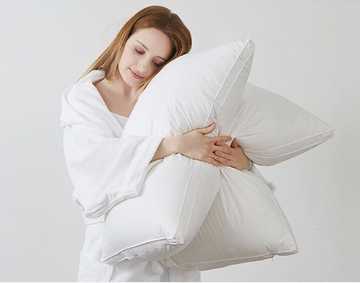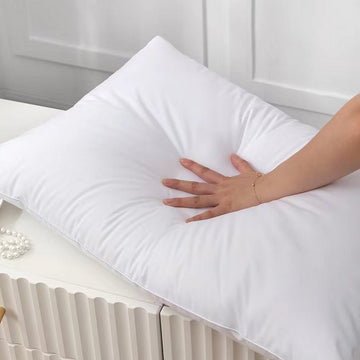Understanding Goose Down and Its Sourcing
What is Goose Down?
Goose down is the soft layer of feathers close to a goose's skin. They are light and keep geese warm. People like down for pillows because it's soft and keeps heat well. The down is plucked from live or slaughtered geese. This has sparked debates over whether it's ethical or not. Different ways of getting down have different impacts on animal welfare. Consumers are now looking for kinder ways to enjoy down's comfort. As such, the ethics of goose down are important to consider.

How is Goose Down Harvested?
Goose down is taken from birds' under feathers. It's soft and warm, making it prized for pillows. There are two main ways to get it. The first way is by collecting feathers shed naturally. It is a gentle process. Farmers pick up feathers that geese lose during molting. The second method is live-plucking. This involves pulling feathers from live geese. Many see this as harsh. It can hurt the birds and cause stress. Some farms pluck after the geese pass away. This method can be less harmful. Knowing how down is harvested helps us choose wisely.
Ethical Considerations in Goose Down Production
Treatment of Geese in Down Harvesting
The treatment of geese when harvesting down raises ethical issues. The birds may suffer if plucked alive. This process can cause pain and distress. Some farms keep geese in tight spaces. They don't move much, which is not natural. Others force-feed geese for foie gras, which is cruel. Farmers may do this to get more down. Ethical farms wait for geese to molt. They gather down without hurting the birds. We must think about how we treat geese. Choosing humane down products is important.
Sustainable and Ethical Alternatives to Traditional Down
When considering the ethics of goose down, it's important to explore alternatives. Here are some sustainable and ethical options to traditional down:
- Organic and responsibly-sourced down: Down certified by the Responsible Down Standard (RDS) ensures ethical treatment of birds.
- Down-alternative fills: These are made from synthetic fibers and offer warmth without using animal products.
- Wool: Wool is a renewable resource and can be collected without harming the sheep.
- Cotton: Cotton is a plant-based, biodegradable option that can provide comfort though less insulation.
- Bamboo: Bamboo fibers are sustainable and offer natural antibacterial properties.
Choosing these alternatives can help reduce the impact on animals and the environment.
Making an Informed Decision
How to Choose Ethically-Sourced Down Pillows
- Research the source of the down. Look for certifications like RDS.
- Choose brands that are transparent about their sourcing practices.
- Consider the welfare standards of the farms providing the down.
- Look for pillows filled with down from geese that are not live-plucked.
- Check for third-party audits of the supply chain.
- Opt for pillows with high fill power as it may indicate less harvesting impact.
- Support companies that invest in ethical practices and animal welfare.
- Seek out retailers with strong return policies in case of ethical concerns.
The Rise of Synthetic Alternatives
As consumers, we face many choices. When it comes to pillows, synthetic alternatives to down have grown. These alternatives do not harm animals. They can be just as cozy and warm as real down. Some are made from recycled materials, adding eco-friendliness. Popular synthetics include polyester fibers and memory foam. Brands are now focusing on comfort and sustainability. This shift can lower the demand for down. It helps protect geese and other birds. People who care for animal welfare can choose these options. This way, they sleep well knowing they made an ethical choice.
The Impact of Consumer Choices on Animal Welfare
Consumer choices have a big effect on animal welfare. When people buy products, it sends a message to companies about what they value. If more people choose ethical products, it can lead to better treatment for animals. Shifting demand away from unethical goose down can make a change. It can push for more humane practices in the industry. Each purchase acts like a vote for how geese are treated. So, it is important to think about the impact of what we buy. Ethical buying can help protect animals and encourage better standards.






